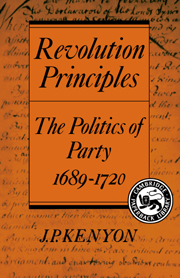Book contents
- Frontmatter
- Contents
- Preface
- Preface to the paperback edition (1990)
- 1 Introduction
- 2 By force or by miracle
- 3 The measure of submission
- 4 This skein of tangled principles
- 5 King Charles's head
- 6 The bloody flag
- 7 Revolution Principles
- 8 Black and odious colours
- 9 The four last years
- 10 That triumphant appellation
- 11 Conclusion
- Appendix
- Abbreviations
- Notes
- Addendum
- Index
6 - The bloody flag
The High Church revival
Published online by Cambridge University Press: 07 October 2009
- Frontmatter
- Contents
- Preface
- Preface to the paperback edition (1990)
- 1 Introduction
- 2 By force or by miracle
- 3 The measure of submission
- 4 This skein of tangled principles
- 5 King Charles's head
- 6 The bloody flag
- 7 Revolution Principles
- 8 Black and odious colours
- 9 The four last years
- 10 That triumphant appellation
- 11 Conclusion
- Appendix
- Abbreviations
- Notes
- Addendum
- Index
Summary
The High Church movement had its origins in the deep and understandable concern felt by many clergymen at the rampant growth of Socinianism, Deism and other ‘heresies’ in the new atmosphere of liberalism after the Revolution. In the persons of men like John Toland there was a direct link between this religious deviationism and political radicalism, but it was an association that would naturally have been made in any case. In the same way, it was natural to blame the Dissenters, if only because the emergence of a problem of Christian belief coincided with the passing of the Toleration Act of 1689, which gave them freedom to worship in their own ‘meeting houses’. Since a direct identification was still made between the Dissenters and Cromwell's Puritans, an identification hammered home from the pulpits every 30 January, it was also natural to regard them as tainted by democratic and ‘levelling’ notions – an idea confirmed, again, by the attitude of prominent Dissenting journalists like Defoe. Also, in a very direct way the Toleration Act had weakened the authority of the clergy and the church courts over the laity, for in a situation in which some Protestants could legally opt out of church services it proved impossible to enforce the attendance of any, so that the Uniformity Act became a dead letter.
Particularly odious was the practice of ‘occasional conformity’, by which Dissenters qualified themselves for secular office under the terms of the Test Act by taking the Anglican sacrament on one occasion, or at long intervals.
- Type
- Chapter
- Information
- Revolution PrinciplesThe Politics of Party 1689–1720, pp. 83 - 101Publisher: Cambridge University PressPrint publication year: 1977
- 2
- Cited by



